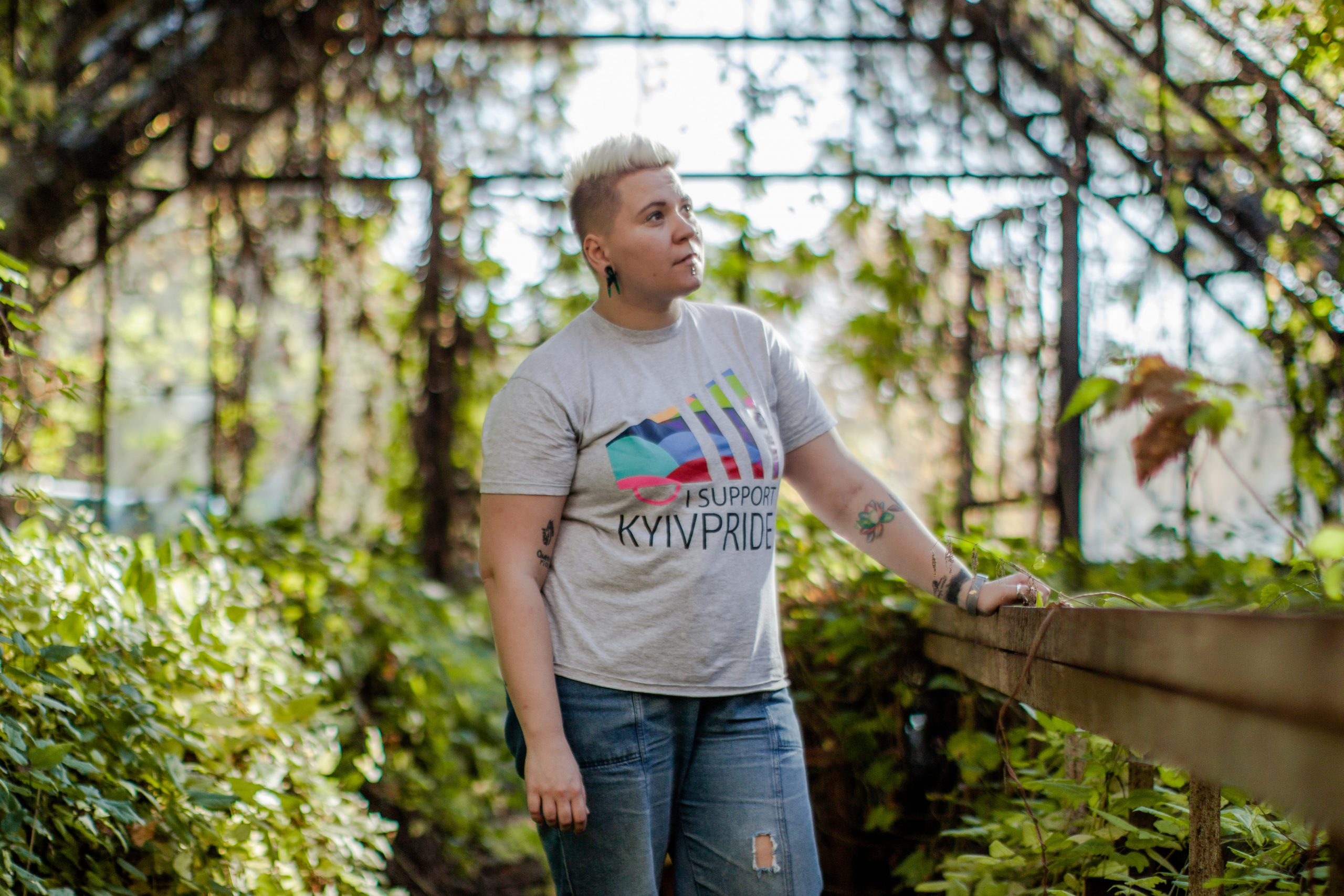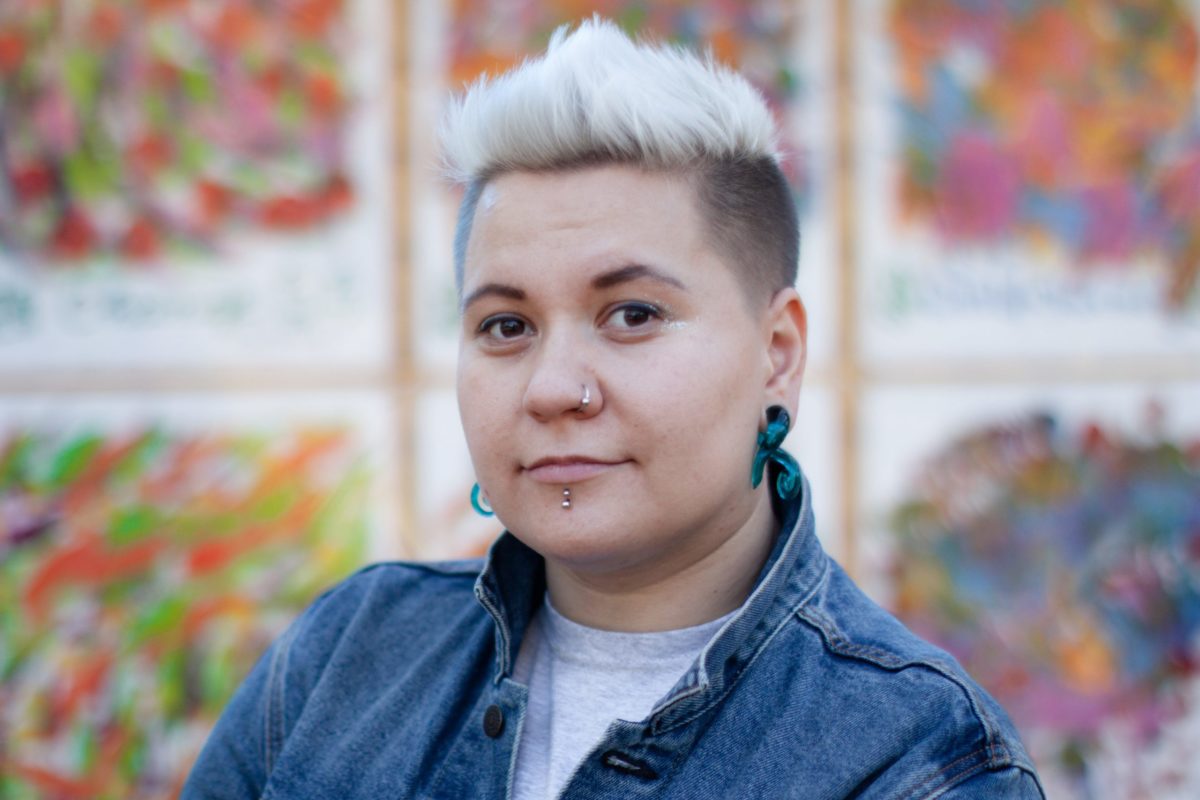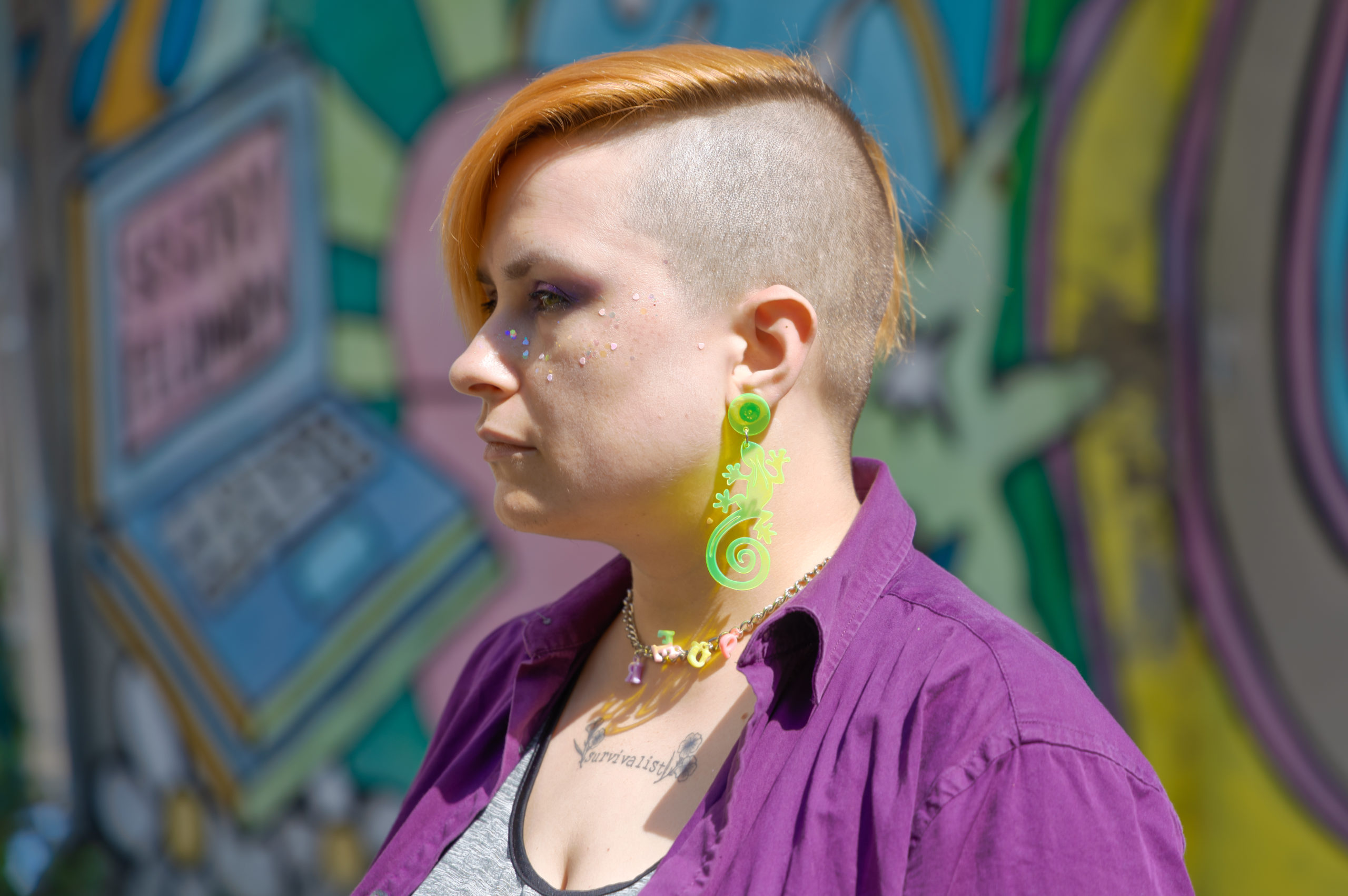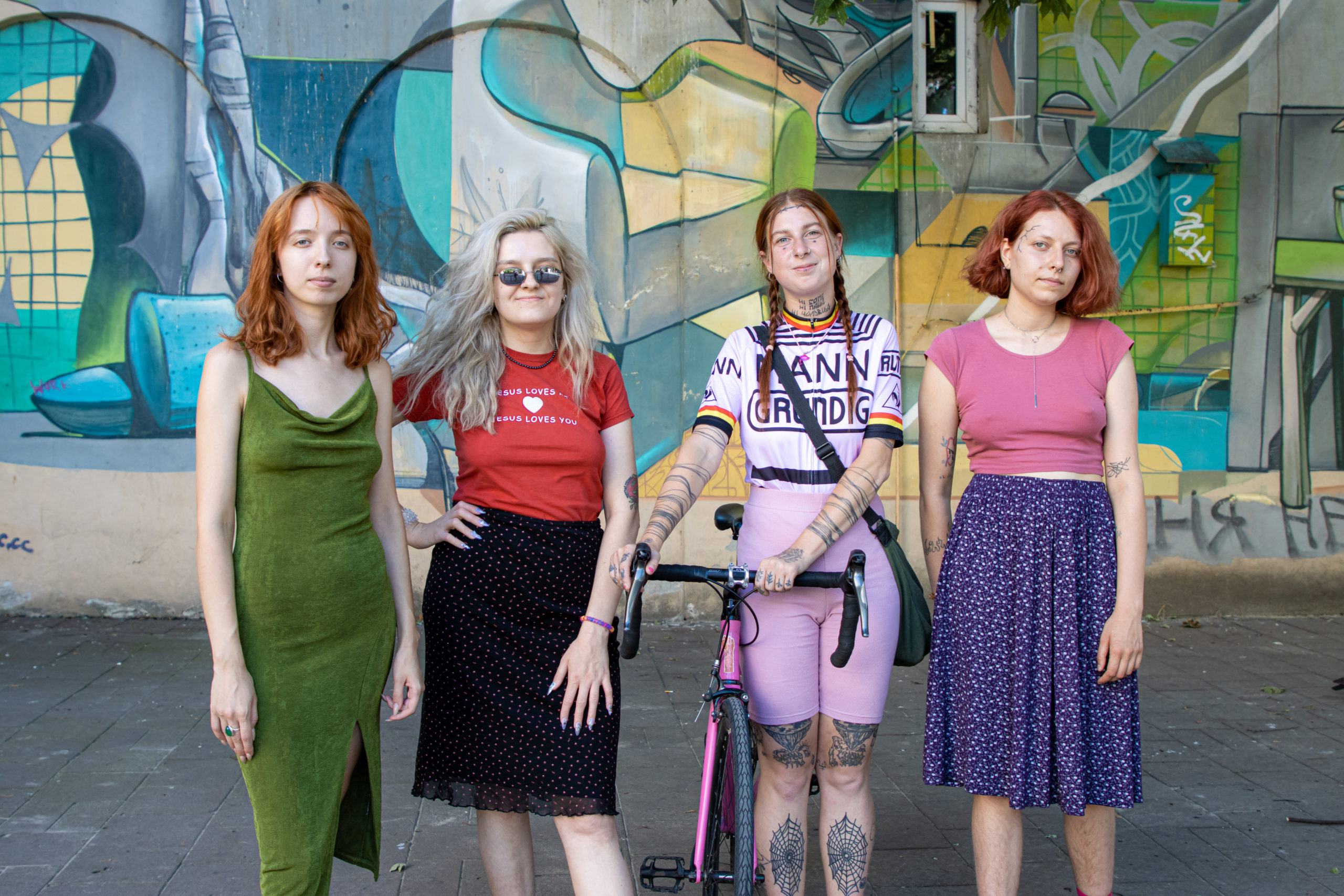Marina Herz
On Pride, queer, and freedom to be yourself
15 November 2019
Editor: Bozhena Makovska
Translator: Maryna Isaieva
Photographer: Michael Tulsky
Queer for me is a rejection of the need to define myself, my sexuality, and names. The theory of sexuality does not stand up to criticism regarding the non-binary nature of sex, it does not include intersex people. For example, I was married to a man, had a relationship with a lesbian, with a trans woman, and a trans man, non-binary and agender people. Who am I? What is my orientation?
I became an LGBTQ activist in 2011 when I fell in love with a girl. At that time, I was married to a man, and I saw that my relationship with my husband and my relationship with a girl were perceived differently by society. I googled if there were LGBT people in Russia, and found an organization in my city. At first, I was a volunteer, then an activist, and later — the coordinator of the community centre. At some point, my feminist position was formed, and I created the Gerbera initiative. We were the first to organize a rally on March 8 in Tyumen, conduct seminars on violence and women’s rights, and also participated in the “Eve’s Ribs” festival for several years in a row. After I moved to Kyiv, other Gerbera participants continued to work, the initiative still exists.
Even before the law on “LGBT propaganda” was adopted in Russia, I was a living book at the festival, and some man filed a petition against me to the prosecutor’s office. I had to visit it and give evidence, even though there was not even a relevant law. For feminist activism and street actions, a file was brought against me at the Center for Combating Extremism. It was difficult to continue working in Russia. Then I was offered a place in Gay Alliance Ukraine, everything worked out successfully, and I moved. In Kyiv I felt more freedom. It’s here where my activism began to flow. However, people did not know who I was, and I needed to collect social capital again.
In 2016, I first went to Pride and felt the opportunity to be myself — in Russia, this is basically impossible. For LGBTQ people in Tyumen, there are only two places where you can go: a club where parties are held and a community centre for events and psychological support groups. Some people go to both places, some separate. People who come to the club hide all week who they are, and only there they can relax, dance under the influence of alcohol, love each other, and be free for several hours. I was very sad to look at them and be aware of this.

“It has always been difficult for me to define myself, especially as a teenager.”
I reflect a lot on masculinity and femininity. My friends pay attention that I often choose masculine patterns of behaviour, and I agree — this is how I feel more confident. It has always been difficult for me to define myself, especially as a teenager. I remember the first grade of school when I sat at a concert in the front row, legs wide apart. It fell into the photographs, all high school students laughed at me, and my mother scolded me. To the phrase “You are a girl!” I always answered: “I am not a girl. I am Marina. Leave me alone.”
When I started to engage in LGBT+ activism, I learned about the term “agender.” For a while, I called myself an agender and non-binary person. At that time, I had severe dysphoria. I took hormonal drugs as I wanted to make the transition and undergo a mastectomy. Although the pills greatly worsened my health, and I abandoned this idea. In 2015, I learned about queer theory: I read books and went to seminars with a partner, a transgender man who suffered from his own transphobia. We began to understand the theory together. It helped him to accept himself and greatly changed my worldview. Even though now I am positioning myself as a queer person, it is important for me to voice that I am a political lesbian. I speak of myself in the feminine gender, advocate for the rights of lesbians, and the rights of women, when necessary.

I was not happy with the representation of queer and trans people at Kyiv Pride, and in 2017 I decided to go to the organizing committee to change the situation from the inside. Later, I started working at Kyiv Pride projects, first as a trainer, then as a program coordinator. This year I was responsible for the conceptual content of the Pride program. Six people stably lead the projects, but there is another vital part of the team: the volunteers, without whom there would be no Pride. During Pride Week (a series of educational events), they help us undergo first aid training and monitor safety on the march.
Now we are trying to strengthen our institutional capacity, organize a system of work. The organisation’s main goal that we elaborated on strategic planning is to increase the visibility of the LGBTQ+ community in Ukraine. Kyiv Pride is one of the first public and largest LGBTQ+ events in the country. Therefore, one of our activity directions is the development of regional initiatives, in the framework of which we allocate grants and support activists, teach them how to write applications, conduct a dialogue with the police, and how to mobilize the community.

“To organize a Pride march is insanely hard. We encounter great resistance from the state and even in the LGBTQ+ community itself.”
We have to balance all the time. For example, the community criticizes us for censoring posters, while restrictions were put by the police as a prerequisite for the march. Between us, we call July “the month of the corpse” because, at that time, we are on the verge of our physical abilities and emotional resources. I myself came to Kyiv Pride because of criticism, but now I began to treat it differently: it is easy to criticize from the outside, not knowing what difficulties we are facing and what resources we have (or do not have at all).
This year, we made a paid entrance to the party for the first time because we could not pay for its organization. Donors do not support such events, but we think that parties are important for the community. It’s about freedom and self-expression. A stream of criticism fell upon us. People demanded financial reports, wrote angry posts on social networks. It was hard for me to cope with this, but I try not to lose contact with myself, my feelings, and my needs. I always ask: “How would you do it differently?”

“Queer theory is important, but this concept is not yet available to people.”
LGBTQ organizations have both sexism and misogyny. It can be challenging to agree because everyone has different agendas and a vision of work. There is no single community, even in Ukraine, and common values within it. At least I don’t believe that. Working with donors is also not easy. There are criteria, indicators, and they must be met. Sometimes I have to be more flexible than I would like, but without their support, we would not be able to cope. We live in a capitalist society where you have to pay for everything, and activists also need to eat something.
In media campaigns, the “born this way” rhetoric predominates because it’s easier to explain with it. I do not know if this is bad — I’m at a crossroads so far. When I myself became an activist and did not understand the queer theory, it was also easier for me to accept this position, and for a while, I supported it. People need stereotypes, this is how our brain works. Now Pride has become popular because it has become clear.
This year I taught the Ukrainian police, and we examined a real case — an attack on a lesbian. The attackers decided that she was a guy, began to scold her and beat her, and the police refused to accept the statement. At the training, many said: “So let her sit at home!” and “Let her find a man!” I had to explain such things that men and women are equal, that LGBTQ people exist. Queer theory is important, but this concept is not yet available to people. I don’t know what to do with it. What message can be formulated so that it does not contradict our beliefs but is understandable to people? So far, I am in search of an answer, how to be understood, and at the same time not to lose myself.

The representation of queer and trans people is still insufficient, but the situation is changing. This year, for the first time, a full-fledged trans day was held on Pride Week, the opening of the exhibition, and events dedicated to the problems of trans people. Now we are thinking about projects that can increase the visibility of LGBTQ+ people who experience cross-discrimination. For the LGBTQ military, this is, for example, the safety of a coming out. LGBTQ people with disabilities face ableism and xenophobia both within the community and society as a whole. We also had a positive experience of holding an event about Roma LGBT. I believe that visibility is one of the tools to overcome homophobia and transphobia, and it really matters to me.
“I do not want to hide who I am to reduce my expression. I want to be myself — in the urban, information space — just to be.”
Earlier, activism seemed to be an endless swamp in which I flounder but see no results. Now everything is different. I began to see changes over the past year: attitudes toward the Pride have changed, interest has grown, more and more support is coming from people and other institutions. Pride’s positioning has also changed. Our last year’s slogan, “The Land of the Free— Be Yourself”, is very close to me personally. I do not want to hide who I am to reduce my expression. I want to be myself — in the urban, information space — just to be. I plan to spend the next two years in Ukraine and continue to work at the Pride, and after two years, I do not think. I have chronic depression. Now I am undergoing treatment and taking care of myself. Not responding to work messages after eight in the evening can be difficult due to the irregular schedule, but I try to balance it. I like to walk, read books, play ukulele, and sing in my free time. Such banal advice as a full sleep and walks in nature, for me, really works.



